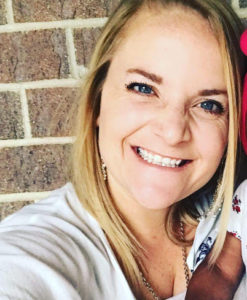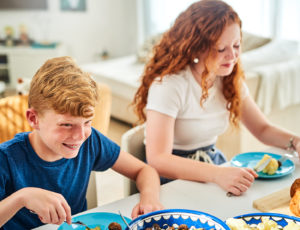How to Fill Your Family Mental Health Toolkit


Megan Akinmoladun, KVC Nebraska Outpatient Therapist
New routines can be hard – even in summer when school is out. Schedules may be lax and some families may struggle to maintain structure. KVC Nebraska Outpatient Therapist, Megan Akinmoladun says creating a summer family mental health toolkit can help. She shares ways to make it fun and ideas on how to strengthen your family.
In her work with our Outpatient Therapy program, Akinmoladun provides in-home therapy and support for at-risk children and youth and their families. She describes her role as “helping families become better and stronger.” Her creative, engaging and educational ideas encourage positive growth for families – and kids of all ages.
Get your family started with Outpatient Therapy today! Call Taylor Cambridge at 402-880-4926.
Organize Your Day
Akinmoladun says first start with a plan to keep everyone on track. “I talk to families about planning ahead,” Akinmoladun says. “Create a daily or weekly activities calendar to help get organized and maintain structure.” Be flexible about changes.
Make the project a family affair and have fun with it. “Parents and kids can get creative and draw pictures of the activities on the calendar,” she says. “This works well for young children who may not be reading yet.”
Go over the calendar at the start of the day. Everyone will know what is happening and what they are doing. “This is important for families who are super busy and active,” Akinmoladun explains. “It helps older children and teens who juggle multiple activities like sports and jobs.”
Be Consistent About Expectations
Akinmoladun counsels parents to keep behavior expectations in place. “Be consistent. Continue what you were doing when school was in,” she advises. “Use the same reinforcements, rewards and consequences for behaviors to create expectations in the home and to make it happen.”
Lay the groundwork. Be clear about what you expect. “Explain that even though things may change a bit because it’s summer, you still expect ‘A, B, and C’,” she says. “If ‘A, B and C’ are not followed, detail the consequences and follow through.”
Follow-through is a must. “I tell parents to step up their game,” Akinmoladun stresses. “And hold themselves accountable.”
Explore the Outdoors

“There are many healthy reasons to get outdoors,” Akinmoladun explains. “It helps us feel better! Vitamin D from the sun is good for our mental health. It lifts our mood and reduces depression,” she adds.
Physical activity helps burn energy, improve sleep and promote mental well-being. Plus, it’s great for family bonding time, creativity and teachable moments! Here are some suggestions for outdoor activities:
- Look for new ways to enjoy nature. Visit parks and trails outside of your community.
- Hit the pool
- Go biking, hiking, walking or jogging
- Have an outdoor scavenger hunt
- Bring along art supplies (chalk, crayons, construction paper) for sidewalk drawing or nature rubbings
When You Can’t Get Outside
When the weather doesn’t cooperate enough for outside fun, Akinmoladun suggests bringing the outside in. “Create sensory bins with sticks, flowers, rocks and leaves. Keep art and craft supplies on hand, too.”
Here are some other ideas for fun indoor activities:
- Get active together and try some indoor exercises! Watch this video for some ideas.
- Schedule an hour or two of structured playtime
- Bake a batch of your favorite cookies
- Make slime together. Try this easy recipe to get started.
- Jolly Rancher suckers, anyone? Give them a try.
- Get artistic! Check out this video for a watercolor exercise to help kids express their emotions.
- Encourage sensory play by creating Play-Doh scenes using glitter, pompom balls and other props.
Limit Screen Time
 Screen time is not a bad thing. Too much screen time is. “Excessive screen time can harm brain development and impede growth,” Akinmoladun explains. “And it can create poor functioning in the brain.”
Screen time is not a bad thing. Too much screen time is. “Excessive screen time can harm brain development and impede growth,” Akinmoladun explains. “And it can create poor functioning in the brain.”
For younger children, schedule about 30 minutes to an hour of daily screen time. “Set a timer,” she says. “Parents can make screen time a reward for having a good day,” she continues. “Position it as an earned privilege.”
When time is up, transition to another exciting activity – snack time or reading time. This makes the change less stressful. It can be hard to get older youth and teens off their devices. “Consider using a lockbox to help manage screen time.”
Akinmoladun says parents can take the lead and lock their screens, too. “It’s hard to tell kids to get off of their screens when they see you on your phone all the time,” she continues. “Schedule a set time to lock away screens.”
Mealtimes are good for family bonding. Use the uninterrupted time to discuss the day’s activities and events and catch up.
Embrace Mindfulness
Make mindfulness practice part of your family’s mental health toolkit. “Mindfulness is a mental health wellness tool that helps improve focus and regulate emotions,” Akinmoladun explains. “It is being present and self-aware about how your mind and body are feeling.”
Parents, caregivers and children can use mindfulness anytime they need to relax or center their thoughts.
Three Ways to Practice Mindfulness
- Yoga is a good way to introduce younger kids to mindfulness. Try this Yoga for Beginners video. It’s family-friendly and great for all ages.
- Five Senses is an educational relaxation and focusing exercise that helps kids learn how their senses work. Parents can coach Five Senses. Start by asking questions like,” What do you use your ears for?” or “What does your nose help you to do?” This helps heighten awareness and encourages us to be present in our current environment.
- Awareness/relaxation is another way to focus on what our bodies are doing and strengthen self-awareness. “This practice works for older children and youth, too,” says Akinmoladun. For example, someone can start by asking, “What are your feet and toes doing right now?” or “What are you doing with your arms?”
Ease Back Into Life After COVID-19
 Your family mental health toolkit should include post-pandemic plans. Akinmoladun has seen an increase in social anxiety among pre-teen and teen youth. “Some kids may be nervous about returning to in-person school,” she says.
Your family mental health toolkit should include post-pandemic plans. Akinmoladun has seen an increase in social anxiety among pre-teen and teen youth. “Some kids may be nervous about returning to in-person school,” she says.
“I tell families to look forward to school orientations. Walkthrough the building with your children and offer positive words of encouragement,” she continues.
Coach kids through mindfulness to help them breathe and relax. “Constantly stress how important it is to be present and self-aware.” When they start to feel anxious, remind them that others feel the same way they do. They are not alone.”
Families can support one another by having frequent check-in conversations. “Ask how everyone is doing and how they are feeling,” says Akinmoladun.
“Parents can reintroduce friends who have been apart for the last year.” Akinmoladun suggests starting slow. “Consider a play date or field trip with a small group to help your child relax and feel comfortable.”
Don’t Neglect Self-Care
Parent and caregiver well-being is an important part of family mental health too! Akinmoladun urges caregivers to make time for self-care. “Some parents are still working from home and it can be hard to get away,” she says. “Schedule time to get out of the house. Take a walk or head to the gym for a good workout.”
When you can’t get out, take a break at your desk, grab a coloring book or read a good book to relax. If you’re home with young children, set aside time during the day or after their bedtime.
How KVC Nebraska Helps Improve Family Mental Health
 Our Outpatient Therapy program provides in-home services to children ages 0 to 19 and their caregivers to promote mental wellness, social and emotional well-being, and positive caregiver-child relationships. We work to meet the needs of children, adolescents and adults so they feel safe and connected to each other and their communities.
Our Outpatient Therapy program provides in-home services to children ages 0 to 19 and their caregivers to promote mental wellness, social and emotional well-being, and positive caregiver-child relationships. We work to meet the needs of children, adolescents and adults so they feel safe and connected to each other and their communities.
“Therapists will meet families where they are in their homes,” Akinmoladun explains. “The new program will be child and youth-focused. Our goal is to help children and youth manage their mental health and give them tools to help cope.”
Learn more about this program and get your family started with these services by calling Taylor Cambridge at 402-880-4926.
“We are here to be a ray of hope and light in their lives.”